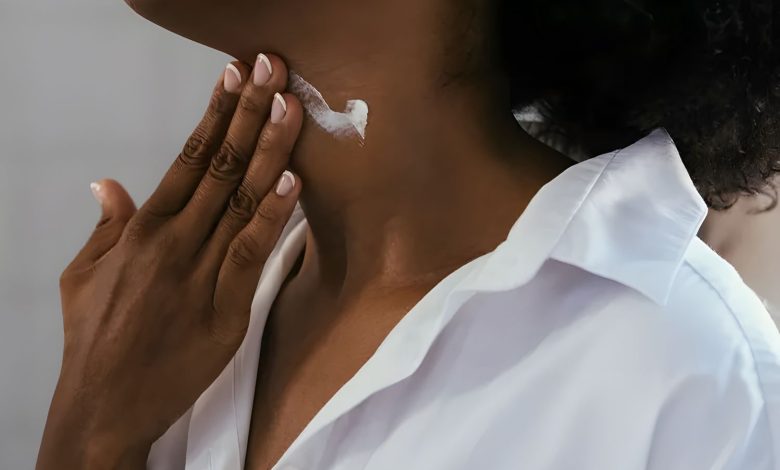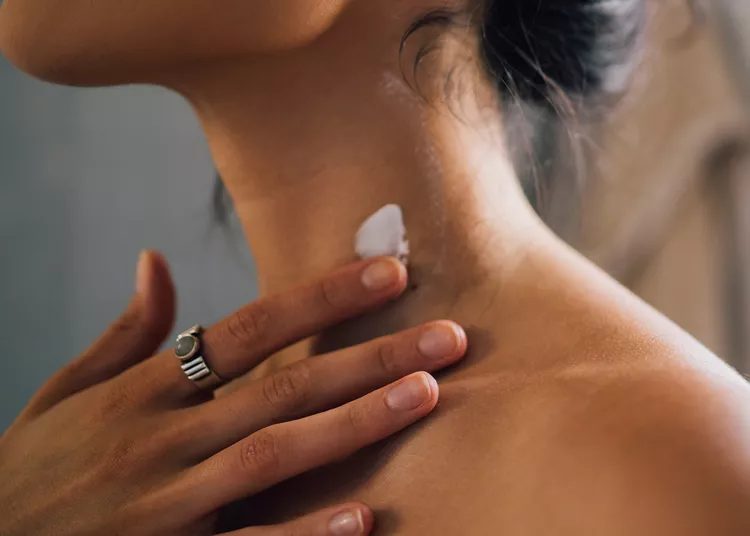
Acne is a concern for many people, particularly if it occurs in a highly visible area, such as the neck. Depending on the causes of pimples such as genetics, hormonal imbalances and skin care ingredient-related inflammation the treatments that you choose may not be as effective as you hoped.
The best way to prevent neck acne is to adopt a regular skin-care regimen and make lifestyle changes to reduce triggers, says Marie Jhin a dermatologist from California and the chief medical officer of Musely – an online dermatologist platform and prescription skin care.
Pros say that when it comes to neck breakouts, choosing the right at-home treatments and professional treatments can be helpful. They also recommend identifying the root cause. A board-certified dermatologist will evaluate your skin, your skin care routine, and make a recommendation for the best products to use in order to control neck acne.
We reveal the causes and prevention of neck acne. Our dermatologists and experts offer a 360-degree treatment plan for neck acne, both at home as well as with a dermatologist.
What is Neck Acne ?
Neck acne is simply acne that appears on your neck. This can be whiteheads or blackheads and even cystic acne. It can appear anywhere, from your chin to your chest.
“Like acne on the face and neck, the severity of neck acne can vary. It tends to be worse along the jawline, especially for acne caused by hormones, and also behind the ears and along the neckline, as well as the back and sides of the neck, where sweat and clogged pore problems may occur,” says Dr. Jhin.
Causes of Neck Acne
Ryan Turner, co-founder and dermatologist at TRNR Skin in New York City, says that breakouts on the neck are similar to those that occur anywhere else. He says that a pimple is caused by a blocked pore, which can be due to excess sebum or a buildup dead skin cells. The pore becomes inflamed and tender, leading to a red pimple. Neck acne can be caused by a variety of factors. It may appear as chronic or random breakouts.
Blair Murphy-Rose MD, a dermatologist and clinical instructor at Weill Cornell Medical College, says that neck acne is caused by a combination genetics, hormones, and bacteria. Some people are genetically more predisposed to developing acne, which is partly driven by androgens hormones. But there are also other factors. According to Dr. Hartman “Other causes can include friction caused by clothing around the neck, which can cause irritation and acne. Excessive sweating can also lead to acne.”
Women with PCOS are more likely to develop neck acne. This condition causes hormonal fluctuations and increases the production of oil. Men can also suffer from neck acne due to shaving or ingrown hairs, which look like pimples.
How to prevent neck acne

Getty Images
Experts agree on the importance of focusing neck skin care to prevent neck acne.
Dr. Turner says that neck acne is a chronic skin condition. To prevent pimples from appearing, you may need to incorporate anti-acne products into your daily routine. You may have to incorporate anti-acne products into your routine if neck acne is a persistent skin condition. Dr. Hartman says that if you have neck acne regularly, it is a good idea to use over-the counter spot treatments. If they don’t work within two to four week, you should consult a dermatologist to get a more detailed evaluation and treatment plan.
Dr. Murphy Rose says that a skin care regimen can help prevent acne breakouts and treat existing ones by removing sebum from pores and exfoliating skin cells. Dr. Loretta Circle, a Miami dermatologist who founded her own skin care line Dr. Loretta says the most common cause of neck acne among patients with long hair are the products they use to wash their hair. She says that she has found the best way to prevent acne on the neck is to avoid hair care products that cause neck acne for those who are sensitive to them. In my 42 years of practice, I’ve found that argan oil and artificial fragrances are the two most common ingredients in hair care products that cause neck acne, sometimes also on the face.
Dr. Turner also suggests that you be mindful of what and how you dress. He says that if you like wearing turtlenecks you should avoid wearing tight-fitting clothing or accessories around your throat. If you do wear them, you should wash them often.
Avoid Neck Acne
If you want to treat neck acne in a multi-faceted way, it may be necessary to change your daily habits and your skin care routine. Dr. Jhin advises against harsh rubbing, which can irritate your skin and worsen acne. Avoid skin care and hair products with comedogenic ingredients, or those that irritate the skin. Opt for products without oil or non-comedogenic ones to reduce pore blockage.
She recommends avoiding tight-fitting clothing, collars around necks and non-breathable materials. “All of these may trap sweat or oil against your skin,” she says. The pros also advise that you should avoid letting your hair sit on your throat, and make sure to keep it clean if it does. She adds that hair products such as gels and styling creams may transfer to the neck skin, clogging pores.
Dr. Ciraldo advises that if you have neck acne, it is best to avoid picking at it. This could worsen the problem and cause healing problems. She explains that neck acne is more likely than facial acne to leave scars and take longer to heal.
Home Treatments for Neck Acne
When it comes to treating acne, Dr. Turner says that the best skin care products are those with glycolic acid. One of the things that can lead to acne is the accumulation of dead skin cells. This is why Dr. Turner recommends glycolic acid. It is an alpha-hydroxyl acid that breaks down the bonds that hold dead skin cells on the surface and helps them fall off.
Pros say that other acne-fighting products are just as effective on the neck as the face. Dr. Hartman says that salicylic is one of the most commonly used active ingredients in treating acne. Salicylic acid, a beta-hydroxy acid, is a chemical excfoliant which can help reduce swelling, redness, and dirt in your pores. Benzoyl Peroxide, a pimple killer, is especially effective if you have neck acne that is mostly whiteheads and cysts. Dr. Hartman says that benzoyl peroxide, an anti-inflammatory, is effective in treating mild to moderate acne. It works by killing the p.Acnes bacterium that causes acne. But it can also help prevent acne by exfoliating your skin and reducing redness and swelling.
In addition to the other acne-fighting agents, he recommends using niacinamide as a calming agent. He says that niacinamide, which is not commonly used as a topical treatment, is an active ingredient he recommends for acne-prone patients, particularly if their acne is inflamed. It’s an anti inflammatory that can reduce swelling, and studies have shown that it can also treat acne. She says that red light can reduce inflammation and blue light will help to fight bacteria that promote acne. Her favorite neck acne treatment is the CurrentBody Skin LED neck and dec perfector, $339. It targets both the skin on the neck as well as that of the face. The last but not least is retinoids.
Dr. Turner explains that retinoids can help with acne on the neck and face by stimulating cell turnover as well as regulating sebum. “This one-two punch helps to accelerate skin’s natural exfoliation processes and prevent an excess of sebum buildup, both of which cause blemishes.” Dr. Turner also notes that “although you can always buy an over-the-counter retinol, the most effective option will be a prescription-strength retinoid like Tretinoin, which you can get from a dermatologist.”
How Dermatologists Can Help Treat Neck Acne
If you are still experiencing neck acne despite using skin care products, treatments and lifestyle changes, it may be time to seek professional help.
Dr. Ciraldo has reported that professional chemical peels in the office have produced better results than OTC pads for treating neck acne. She says that she uses a glycolic peel of 35 to 70% every two to four week. In-office chemical peels can be used to treat neck acne because they are more effective than home remedies and have little to no downtime. These treatments, which usually use salicylic or glycolic acids, can take as little as 15 minutes, says Dr. Turner. He recommends returning to the office every few weeks, and believes that a series of three-five peels will provide the best results. In some cases, chemical treatments can produce a mild tingling feeling while in others they can be more intense and sensitizing. The skin will begin to peel over the next week, revealing the new, fresh skin beneath.
A common Rx for neck acne is a prescription-strength retinoid, which, as Dr. Hartman explains, can “expedite cellular turnover and reduce sebum production.” He also opts for microdermabrasion on the neck. Diamond Glow microdermabrasion treatments remove dirt and debris and exfoliate top layers of skin, according to Dr. Hartman. He recommends starting with a series four to five treatments, spaced four to five week apart, and then maintaining the treatment every three to four month. A corticosteroid may be required for neck acne that is cystic. These are quick treatments and are only recommended in an emergency. For example, if a large neck pimple is present before a major event. These injections reduce swelling and inflammation and work quickly. Deep, painful pimples, for example, can take up to a week to heal, but these injections help shrink them within a few days.




